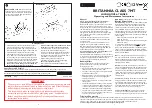
3
2
Fig. 2
Fig. 1
Fig. 3
Fig.9
Lubrication
IMPORTANT – Only apply small single drops of light machine oil to the places indicated in red. This is best achieved by
making a simple oil “dropper” as illustrated in Fig.1. Insert a straightened paper clip into a cork and use a bottle cap as
a container for the oil. A small drop of oil can then be picked up by the dropper and applied in exactly the right place.
Immediately wipe off any excess oil, especially from the locomotive and tender bodies. Only lubricate moving parts.
Apply one drop of oil to each of the valve gear
and connecting rod pivot points indicated in red
in Fig.2, on both sides of the locomotive.
Apply one drop of oil to each of the axle
bearings indicated in red. (See Fig.3).
Accessories
Some accessories may not be
required for your particular model. The chain
guard, vacpipes and articulated coupling cannot
be fitted if the front coupling is to be used when
running the locomotive.
To remove the locomotive body
Detach speedo (Fig.8). Remove bogie as shown in Fig.9, then ease front end of the
chassis downwards from body and gently pull forward from the rear of the body
(Fig.10), to enable access to the DCC unit (Fig.11).
Fig.7
Fig.8
Fig.10
EITHER / OR
Fig.6
To re-assemble
When re-assembling, please make sure that
the lubricator locates into the hole in the footplate (Fig.12) and that
the rear chassis hook locates fully into the rear body slot (Fig.13).
Fig.12
Fig.13
Locomotive to Tender Connection
Using the upper half of the 2-part EPS tray as
support (Fig.4), couple the locomotive and
tender together and connect the wire assembly
as showin in Fig.5.
Fig.5
Fig. 11
Fig.4
TENDER
1
2
4
5
3




















